'I realised what a great leader he was by the way he took decisions to undertake the most-risky of missions.'
IAF Veteran Air Commodore Nitin Sathe salutes Air Vice Marshal Chandan Singh whose leadership and planning helped Indian troops capture Dacca in the 1971 War.

IMAGE: Air Vice Marshal Chandan Singh MVC AVSM VrC VSM.
All photographs: Kind courtesy Sajjan Singh
Here's a hero of the 1971 War about whom not much has been written about after the war.
A biography titled A Cavalier in the Sky written by Major Chandra Kant Singh, a family friend, was released after his death on March 29, 2020.
This book takes us through Air Vice Marshal Chandan Singh's extraordinary life and the Indian Air Force of those times.
Chandra Kant Singh and then Group Captain Chandan Singh met each other on board a Chetak helicopter while they carried out a recce for the Special Heliborne Operations being planned to deploy troops across the Meghna river in the first week of the 1971 War.
"Squadron Leader Pushp Vaid was flying the Chetak carrying out the recce while Chandan and I looked around for possible landing sites," Major Chandra Kant recalls.
"I realised what a great leader he was by the way he took decisions to undertake the most-risky of missions. After the war, Chandan 'adopted' me as his son and we often would sit discussing what all happened during the war," says the veteran, now settled in Jodhpur, where Air Vice Marshal Chandan Singh too lived his retired life.
"That day, we came back with a lot of bullet holes and the co-pilot, Flying Officer Sidhu was also injured.
"An unperturbed Chandan asked Vaid to arrange for Sidhu's evacuation and went about the planning of the exercise with General Sagat Singh as if nothing had happened".
"I wish he had been alive at the launch of his biography; the world would have got to meet the great man in person!" says his son Sajjan who runs the family business and also keenly follows history.

IMAGE: As a Captain in the Jodhpur Lancers.
Born on December 3, 1925 at Bagawas near Jodhpur, Chandan was initially recruited in the Jodhpur Lancers as a 2nd lieutenant when he was just 16.
Having fought World War II in Iraq, Palestine, Persia and Egypt as a soldier, he was motivated by Maharaja Umed Singh to join the Royal Indian Air Force. The maharaja, incidentally, had been conferred with the rank of air marshal by the Royal Air Force.
Chandan was commissioned as a fighter pilot flying Spitfires, but had to move to fly transport aircraft due to an accident.
He served the IAF for 34 years before he retired in 1980 as an Air Vice Marshal.
For his bravery and dedication to service he was decorated with the Vir Chakra (1965) and the Mahavir Chakra (1971) besides the Ati Vishisht Seva Medal and the Vishisht Seva Medal for meritorious service.
Sajjan Singh describes an incident soon after the surrender ceremony at Dacca.
Someone asked a very sombre Lieutenant General A A K Niazi as to why he decided to surrender so soon, without a fight.
Niazi was in no mood to speak and walked towards a senior IAF officer standing nearby and tapped the 'wings' on his uniform. That senior officer was, in fact, then Group Captain Chandan Singh.
"Whether he meant IAF action or my father's bravery is not clear, but in any case, my father was responsible for most of the air action that happened in the east and I would like to believe that Niazi meant my father!" says Sajjan Singh.

IMAGE: Air Vice Marshal Chandan Singh with his wife.
"The earliest memory of my father is of 1967. It was a late marriage and I was barely 2 when dad became a wing commander. I remember him waving out to me every day when I went to school.
"Soon, he was a group captain and we moved to Jorhat where he was to command the important transport base.
"A mosquito infested station with not much of infrastructure, Jorhat was important because most of the transport support operations for the north east of the country were being undertaken from here.
"By the time dad was posted out, Jorhat was shining with major changes in living conditions.
"He established a poultry, fishery, piggery, diary and what not to make the base self-reliant...even the mosquito menace was controlled by use of the citronella plant that grew wild along the runway!"
Jorhat was later chosen to hold the investiture ceremony and parade largely due to his efforts.

IMAGE: Air Vice Marshal Chandan Singh's medals.
"Jorhat was like one big family. It was a simple yet happy life.
"We children unabashedly went to each other's homes, played, ate and slept together."
As a young boy, Sajjan had no clue what his father was up to in the run up to the war.
"I thought he did a desk job since he went with a briefcase every morning and came back late in his staff car.
"Sometimes he would disappear for a few days and we were told he was away to meet 'Lal' Uncle or 'Sagat' Uncle (Air Chief Marshal P C Lal and Lieutenant General Sagat Singh).
"I remember the time when they came home to meet the family over a cup of tea a few times."
"We learned many years later about 'Kilo' Flight and Daddy's role in training the Pakistani pilots in Dimapur and laying the foundation for the future Bangladesh air force.
"Daddy never, or extremely rarely spoke about his role and achievements in the IAF, but I do remember him saying, 'We did what we had to do in less time than we had.... I don't understand what all the hoopla is about?' and I would answer -- 'They didn't award you the MVC and VrC for nothing!' Daddy would just shrug his shoulders and smile".
That was truly one of his greatest qualities.

IMAGE: Air Vice Marshal Chandan Singh playing Charlie Chaplin in a play in Agra.
In his retirement, Air Vice Marshal Chandan Singh and his brother Brigadier Hari Singh, AVSM, would discuss the war, about what could have been done and what was not done etc.
"Whenever I sat down to listen, they would smile and change the topic!
"I did often hear the story about the hero of Rezang La, Major Shaitan Singh.
"Despite being a year older than Daddy, Shaitan Singh joined school late and was my uncle's classmate.
"They were bench-mates at school and trained together to join the Jodhpur state forces together.
"My uncle and Major Shaitan Singh were outstanding sportpersons and the discussions would veer off towards sports more often than not when he was around.
"Dad would also narrate how he had flown the major to Rezang La straight from hospital where he was recovering from frost bite.
"I was so mesmerised by their tales of their valour and would often day dream of being one of them when I grew up!"

IMAGE: Air Vice Marshal Chandan Singh in his flying overalls.
"I met General Sagat Singh a few times not just in Jorhat, but after retirement at his home, aptly named Meghna, in Jaipur.
"He was a tall and imposing man.
"Daddy amd he got along extremely well for many reasons.
"Both were from the harsh deserts of Rajasthan, both from humble backgrounds, both were in the state forces before Independence, and both had known each other for long.
"Most importantly, daddy being a cavalry man before joining the air force, it was easier for him to understand the legendary general's 'army mind'."

IMAGE: Major Chandrakant Singh VrC's book Cavalier in the Sky: Biography of Air Vice Marshal Chandan Singh MVC AVSM VrC.
Air Vice Marshal Chandan Singh had begun writing about his life, which ran into more than 300 pages. a few years ago.
"When we, his children, prodded him to get it into print, he simply tore the entire manuscript!
"He reasoned that no one would be interested in knowing about his life and it was not worth the effort to get the story into print.
"Whenever asked about his life in the IAF, he would clam up and refuse to answer questions," says Major Chandrakant.
It took years of persistent efforts and patience on Major Chandrakant's efforts to get the biography Cavalier in the Sky in print.
How has it been to be the son of one of the great warriors of the IAF?

IMAGE: Then President Sarvepalli Radhakrishnan awards then Wing Commander Chandan Singh the Vir Chakra for his gallantry in the 1965 War.
"In the beginning it was hard to be Daddy's son as friends and relatives expected so much from me! It was like a heavy stone on my head, but as the years went by, this feeling took a 180 degree turn.
"I realised that people treated my family and myself with a lot of respect and many a hurdle that the family faced was sorted out just because of him!"
Air Vice Marshal Chandan Singh is remembered by people who know him as the person who paid for their children's education, a person who got them jobs and one who motivated them to join the armed forces, thus changing their lives for the better.
"Till the month he passed away, he ensured that a large part of his pension was distributed to accounts of girls wanting to study and their welfare.
"After retirement, he ensured that weaker sections were employed in large numbers in our limestone quarry business."
He disliked politics in the armed forces and often spoke his mind about the continued interference of civilians in matters military.
Being a voracious reader right till his end, he was clued up about what was happening not only in India, but about worldly matters too.
"My father was a person who could connect with the young and old alike -- so flexible a personality was he.
"All those who met him know how comfortable he was to get along with and approached him for advice on matters troubling them.
"He was instrumental in getting my son into the army by training him for the exams and the interview.
"He is now a major in the army and I hope he would be able to follow the footsteps of his grandfather!

IMAGE: Air Vice Marshal Chandan Singh and his family.
"My mother was a big support to daddy. It wasn't easy for her as she came from a very different background, and it took time for her to adjust to the IAF way of life.
"But she did it so well and fulfilled her role of an IAF officer's wife in all respects. Though her 'Air Force life' lasted only about 17 years, since Dad retired after that, she is fondly remembered by all who got to know her at ARC Charbatia, Jorhat, the United Kingdom and Delhi and Allahabad."
"A funny incident occurred during the 1962 War.
"Chinese radio announced that they had captured daddy and even gave his full name and service details, as if they had got the information from him during interrogation.
"We were told it was propaganda to demoralise our troops fighting on the eastern front.
"When we tried to find out more from the radio and newspapers, mysteriously, the lights would go off during the broadcasts and the newspapers also did not reach our doorstep for many days."
The family was disturbed and waited for some official confirmation which never came."
One day while the children were returning from school in the school bus, it made an unscheduled halt midway from home.
"Our names were announced and we were asked to get off the bus. And when we got down into the bright sun, we saw Daddy standing there with open arms, his eyes shining even brighter than the sun!
"It was a very emotional moment which is still so fresh in my mind!"

IMAGE: Air Vice Marshal Chandan Singh at the wheel of his MG.
When the air vice marshal passed away on March 29, 2020, Covid protocols had been strictly enforced. Yet, so many people attended the funeral to pay their respects.
The IAF provided the hearse and escort and condolence messages were received from Prime Minister Narendra Modi and Defence Minister Rajnath Singh.
Others who sent personal messages included Jal Shakti Minister Gajendra Singh Shekhawat, who is also the Lok Sabha MP from Jodhpur, Rajasthan Chief Minister Ashok Gehlot, Sachin Pilot, whose late father Rajesh Pilot served under Air Vice Marshal Chandan Singh, former Rajastan CM Vasundhara Raje, then Chief of Defence Staff General Bipin Rawat, then chief of air staff Air Chief Marshal Rakesh Kumar Singh Bhadauria, the chief of the Bangladesh air force and a host of others.
"He made a name whereever he was posted and left a legacy to be adored, followed and emulated."

IMAGE: The 5 Independent Armoured Squadron (63 Cavalry) making a victorious entry into Dhaka. Troops of assorted units and some correspondents can be seen atop tanks.
"Daddy was awarded the Mahavir Chakra for his role in the 1971 War and it is with us at home in Jodhpur."
The citation goes thus, Group Captain Chandan Singh, AVSM. VRC is the officer commanding of an Air Force Station in the East. During the war with Pakistan, he was in the forefront of the air operations conducted for the liberation of Bangladesh.
Group Captain Chandan Singh was also responsible for the planning and execution of the special helicopter operations to airlift two companies of troops of the Sylhet area.
When it became necessary to overcome the obstacles in the advance of the army towards Dacca, he planned and executed the move of nearly 3,000 troops and 40 tons of equipment and heavy guns with the extremely limited helicopter force at his disposal.
This operation entailed landing the troops and equipment near heavily defended areas by night. Prior to each mission he personally carried out reconnaissance in the face of heavy enemy fire.
On the night of December- 7/8, he flew eight missions, deep into enemy territory to supervise the progress of the helicopter airlift and to guide and inspire his pilots who were facing heavy opposition from ground fire.
Later, he flew another 18 missions in the same operation, always leading from the front.
On many occasions his helicopter was hit by ground fire, but this did not deter him from achieving the aim.
The success of this major airborne operation contributed significantly to the fall of Dacca and the capitulation of the Pakistan armed forces, in Bangladesh.
The leadership, drive and determination coupled with the bravery shown by Group Captain Chandan Singh over an extended period of time, are in the highest traditions of the Air Force.
"Being the son of a legend is both a problem and blessing! A problem since people expect so much from me, not realising that I am Daddy's son and NOT him! It's hard!
It's a blessing since wherever I go, I am recognised and introduced to others as 'AVM Sahab's son!' and people become friendly and chatty after that. And if I am stuck somewhere in the labyrinths of government requirements, a mention of daddy's name does ease things out.
"The best thing about being his son is that I get to hear amazing stories of him and his friends, stories that he never would have told me otherwise! Some are still classified, whilst others are in the process of being declassified by the US and Indian governments. Someday perhaps it will be in the open domain.
"If daddy would have been serving in the modern IAF of today, just the thought of how he would have done things that he did with the modern war fighting equipment available is exciting and fires my imagination!"
Please click on the images for a couple more glimpses of Air Vice Marshal Chandan Singh.

IMAGE: Air Vice Marshal Chandan Singh with Jagjivan Ram, India's defence minister during the 1971 War.

IMAGE: A bust of Air Vice Marshal Chandan Singh.
Feature Presentation: Ashish Narsale/Rediff.com
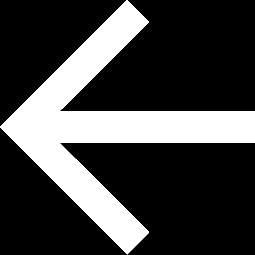
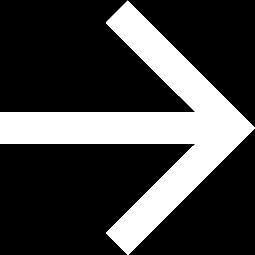
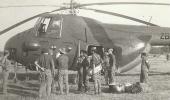
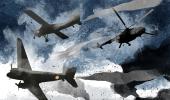
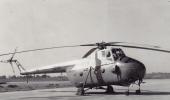
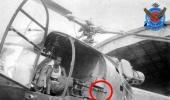
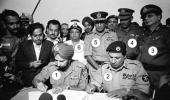






 © 2025
© 2025